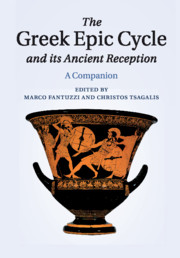Book contents
- Frontmatter
- Contents
- List of illustrations
- List of contributors
- Editorial note
- Introduction: Kyklos, the Epic Cycle and Cyclic poetry
- PART I APPROACHES TO THE EPIC CYCLE
- PART II EPICS
- 11 Theogony and Titanomachy
- 12 Oedipodea
- 13 Thebaid
- 14 Epigonoi
- 15 Alcmeonis
- 16 Cypria
- 17 Aethiopis
- 18 Ilias parva
- 19 Iliou persis
- 20 Nostoi
- 21 Telegony
- PART III THE FORTUNE OF THE EPIC CYCLE IN THE ANCIENT WORLD
- Works cited
- Index of principal passages
- Index nominum et rerum
16 - Cypria
from PART II - EPICS
Published online by Cambridge University Press: 05 August 2015
- Frontmatter
- Contents
- List of illustrations
- List of contributors
- Editorial note
- Introduction: Kyklos, the Epic Cycle and Cyclic poetry
- PART I APPROACHES TO THE EPIC CYCLE
- PART II EPICS
- 11 Theogony and Titanomachy
- 12 Oedipodea
- 13 Thebaid
- 14 Epigonoi
- 15 Alcmeonis
- 16 Cypria
- 17 Aethiopis
- 18 Ilias parva
- 19 Iliou persis
- 20 Nostoi
- 21 Telegony
- PART III THE FORTUNE OF THE EPIC CYCLE IN THE ANCIENT WORLD
- Works cited
- Index of principal passages
- Index nominum et rerum
Summary
General
The Cypria is first of six poems in the ‘Trojan Cycle’, dated sometimes to the seventh, but more usually to the late sixth century BC. The later dating relies on the doubtful evidence of isolated, rarely attested forms. These occur in particularly high concentration in PEG F1(= D., W.), but even here their implications are not clear-cut. Attempts to supply a terminus ante quem by identifying the influence of the Cypria on art and poetry are also beset by methodological problems, chiefly the difficulty of identifying the source of the influence as the Cypria rather than another, similar, poem or the epic tradition quite generally. The Judgment of Paris is depicted on the ‘Chigi Olpe’ of c. 630 BC ‘much as we see it in the Cypria’; but that does not make it an illustration of the Cypria. The Cypria or a poem like it may have been known to the poet of the Iliad, Archilochus, Sappho and Alcaeus. Rarely does the textual record permit one to say with any confidence that it is the Cypria that is known; Euripides' verbatim allusions to Cypria PEG F 1 (below) are exceptional.
The title Cypria was current in the fifth and fourth centuries BC (Herod. 2.117; Arist. Poet. 1459a37); an alternative Cypriaca is attested for a later period.As with Naupactia alongside Naupactica, there was probably no difference between the two titles. As those equally mean ‘(the epic of) Naupactus’, so Cypria and Cypriaca (sc. epea) will mean ‘(the epic) of Cyprus’; less plausible is ‘(the epic of the goddess) of Cyprus’, referring to the prominent role in the poem of Aphrodite. The title Cypria, like Naupactia, probably indicates the region where the poem was believed to originate or to be current. That does not mean that we should expect to see traces of a Cypriot vernacular in the poem. The title Ἰλιακά (The Trojan Epic) also appears have been used, probably abbreviating Ἰλιακὰ Κύπρια (The Cyprian Trojan Epic), of which Naevius’ Cypria Ilias may be a Latin rendering.
- Type
- Chapter
- Information
- The Greek Epic Cycle and its Ancient ReceptionA Companion, pp. 281 - 305Publisher: Cambridge University PressPrint publication year: 2015
- 6
- Cited by



